Noticing your dear old dog’s back legs collapsing can be heartbreaking for you and distressing for your pup. Integrative veterinarian, Dr. Julie Buzby, shares six reasons why an older dog’s back legs might sometimes collapse and what you can do about it.

If you have ever been lucky enough to share your home with senior dogs, you know that along with their greying muzzles, an affinity for naps, and boundless love can come certain health issues. Just like with people, older dogs can slow down a bit, and have some trouble with their joints. One of the more common conditions I treat in my older patients, especially in large breed dogs, is hind leg weakness or even collapse.
Why do a dog’s hind legs collapse?
There are a variety of reasons why a dog might struggle to support his or her weight in the hind end. Some of them happen very slowly. Others may occur in a matter of minutes or hours. Here are six conditions that may be the underlying reasons for a dear old dog’s back legs to collapse.
1. Arthritis
While there are many health issues that can affect the strength and function of dogs’ hind legs, the most common issue I see, by far, is arthritis. Normally, healthy bony joints have layers of cartilage that help to lubricate, cushion, and protect the joint during movement. Unfortunately, cartilage is not great at healing, and with time it can erode. The breakdown of cartilage and the associated inflammation is what causes osteoarthritis. This painful condition can affect the normal function of the joints.
Arthritis may be exacerbated by previous injury or conformation issues. Dogs who have a luxating patella, hip dysplasia in dogs, torn ACL in dogs, and other orthopedic problems are at high risk for arthritis formation. However, even with no predisposing causes, many seniors will show signs of arthritis in dogs as they age.
Arthritis is especially common in large breed dogs such as:
- Labs
- Golden Retrievers
- German Shepherds
- Many other senior dogs

Osteoarthritis of the hips and knees may eventually lead to hind leg weakness. This may cause your dog to have difficulty rising or walking and you may notice his or her hind legs collapsing. Additionally, arthritis may affect the front legs, back, and other joints. This can contribute to your dog’s overall pain level and decreased mobility. Typically, the weakness and pain associated with arthritis happen gradually.
2. Intervertebral Disc Disease (IVDD)
In contrast, some other conditions can cause very sudden hind limb weakness or collapse. One of the frequent culprits is intervertebral disc disease, otherwise known as IVDD in dogs. This is especially common in smaller breed dogs, such as Dachshunds, but can happen in larger dogs as well.
Between each vertebra there are cartilage discs that cushion the backbone as a dog moves. In IVDD these discs get displaced or herniate. This puts pressure on the spinal cord since it lies directly above the discs. Dogs with mild IVDD may only have back pain or leg weakness. Sometimes the affected dog is wobbly and off balance. However, severe spinal cord compression from IVDD can lead to complete, sometimes irreversible, paralysis.

Time is of the essence for dogs with IVDD because the sooner the vet can start treatment, the better the chances of recovery. If your dog’s back legs suddenly collapse, plan on an emergency vet visit at a local pet emergency hospital or your regular veterinarian’s office. Sometimes dogs with IVDD can recover without surgery, but other cases require IVDD surgery in dogs.
3. Degenerative myelopathy
There also are some less common causes of collapse or hind leg weakness in dogs. Degenerative myelopathy (DM) in dogs is an inherited neuromuscular disease that affects some older dogs. DM is similar to Lou Gehrig’s Disease or ALS in people. It is most common in German Shepherds, Huskies, Retrievers, and Corgis.
Dogs with DM typically have a slow progression, starting with loss of coordination, weakness, dragging one or both hind legs, or knuckling in dogs. Eventually it will lead to complete hind limb paralysis. If your vet suspects DM, he or she may recommend a genetic test that looks for mutated copies of the gene SOD-1. Researchers believe that possessing two copies of the mutated gene may put a dog at risk for developing DM. However, there is still much that is not known about this devastating condition.
4. Endocrine diseases
Some metabolic conditions can lead to hind leg weakness as well. Cushing’s disease in dogs is an overproduction of cortisol by the adrenal glands. This can lead to generalized muscle weakness which is often most notable in the rear legs in dogs.
Additionally, in rare cases, dogs with diabetes mellitus may develop diabetic neuropathy. This is a condition where nerve function becomes abnormal, leading to hind leg weakness.

Hypothyroidism in dogs also has occasionally been known to cause nerve damage and muscle weakness. This may lead to laryngeal paralysis in dogs, megaesophagus in dogs, or weakness and collapse (more commonly in all four legs).
5. Acute injury
Of course, hind leg collapse can also be associated with an injury such as cruciate ligament tears (especially if both hind legs have ACL tears), spinal stroke in dogs, or trauma to the hips, spine, or pelvis. Often, these are a bit less of a mystery because you may have seen your dog get hit by a car, fall from a height, take a bad step, cry out in pain, etc.
6. Shock
This one is a bit different than the other conditions on this list, but I believe it is worth mentioning because knowing about it could save your dog’s life. Sometimes when a dog is in shock (i.e. a state of low blood pressure and poor blood circulation) he or she may become very weak or collapse. This may look like the dog is weak and collapsing in the hind end, but really he or she is weak all over. Shock can happen for many reasons, including:
- Allergic reaction
- Bleeding tumor such as hemangiosarcoma in dogs
- Traumatic event
- Heart failure due to heart disease in dogs or heartworm disease in dogs
- Sepsis (i.e. life-threatening condition resulting from the body’s response to an infection)
- Heatstroke in dogs
Many of the medical conditions that cause shock can be fatal if not treated quickly and correctly. That’s why it is critical to get your dog to the vet as soon as possible if he or she collapses.

What other signs or symptoms should I be watching for?
Sometimes in the early stages of arthritis, IVDD, or other musculoskeletal conditions, you may not notice the hind legs collapsing yet. That is just one of the many indicators that a dog’s rear legs are becoming weak. Also, be on the lookout for:
- Difficulty rising from lying down or sitting.
- Exercise intolerance, or not wanting to walk or play as much as your dog used to.
- Stiff or abnormal gait.
- Trembling of the legs.
- Difficulty getting on and off furniture or climbing stairs.
- Signs your dog is in pain such as increased panting (or your dog breathing fast), limping, hiding, attitude changes, a lethargic dog, etc.
- Muscle atrophy/loss of muscle mass.
If you notice your dog exhibiting any of these signs, it’s always best to make an appointment to speak with your veterinarian.
What should I do if my old dog’s back legs just collapsed?
Step one is always going to be getting your dog to the vet. Hind leg collapse should be considered an emergency.
Some of the conditions, such as IVDD or shock, are more successfully treated if treatment is initiated very quickly. And at a minimum, the underlying cause of the hind limb weakness is painful in many cases. So getting your dog relief as soon as possible is a priority.
Your vet will discuss possible differential diagnoses after listening to the history you provide and performing a physical exam. The next step is diagnosis of the underlying cause. In many cases, your vet will want to get some X-rays of the back legs, spine, and pelvis. This allows him or her to see what might be going on with the bones, joints, or organs visible on the X-ray.
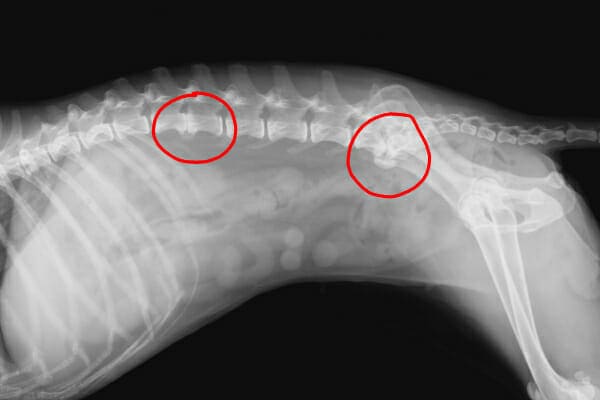
Additionally, your vet may also tell you that it is a good idea to run some bloodwork. This helps your vet identify or rule out some of the metabolic causes of hind leg weakness discussed. Plus, it ensures your dog is healthy enough to metabolize (i.e. break down) some of the medications we may use to treat him or her.
Just as cartilage can wear down in senior dogs, sometimes they can have some underlying kidney or liver dysfunction that isn’t physically apparent. Running baseline bloodwork before starting new medications can ensure the treatment doesn’t have the potential to make an invisible problem worse. Also, it can make it easier to compare pre-treatment and post-treatment values for monitoring purposes.
Referral to a veterinary specialist
Depending on what these tests show, your veterinarian may also recommend a consultation with a specialist. This may be a veterinary neurologist, orthopedic surgeon, internal medicine specialist, etc. These specially trained veterinarians are well equipped to handle the cases that are less straightforward or need advanced testing such as MRI or CT. Also, they can perform more complex surgical procedures such as a TPLO surgery for dogs (in the case of a torn ACL) or spinal cord decompression for IVDD dogs.
If my dog’s legs are collapsing, what are the treatment options?
As you may imagine, treatment can vary depending on the underlying cause of the hind limb weakness or collapse. Dogs with IVDD may need surgery or may be managed medically, depending on the severity. Those with metabolic diseases will have treatment tailored to the particular condition. Your vet will treat trauma and shock on a case by case basis. Unfortunately, there is no effective treatment for degenerative myelopathy in dogs. Symptomatic medical management can make some of them more comfortable, but eventually the disease does progress to complete paralysis.
Treatment options for dogs with hind leg collapse due to arthritis
Since arthritis is one of the most common reasons for hind leg collapse, we will spend a bit more time talking about how to relieve arthritis pain in dogs. For these guys and gals, multimodal treatment (i.e. combining a variety of treatments) can make a huge difference.

Weight loss
My first conversation with parents of dogs with arthritis usually has to do with weight loss. The more weight a dog is carrying, the more stress it places on arthritic joints. A lot of arthritic dogs are overweight or obese, and slimming down makes a huge difference in their quality of life. If you are wondering “Is my dog overweight?“, please talk to your vet and try out my easy method to find your dog’s body condition score. Additionally, check out my article, How to Help a Dog Lose Weight.
Medications
NSAIDs (i.e. non-steroidal anti-inflammatory drugs) can make a huge difference by reducing pain and inflammation associated with arthritis. The parents of older dogs on NSAIDs often tell me their dogs are acting like puppies again! Some dogs may also benefit from other types of pain medication such as tramadol for dogs or gabapentin for dogs. (And if your dog is on gabapentin, be sure to check out my article on gabapentin side effects in dogs).
Joint supplements
There are a variety of joint supplements for dogs on the market today that can support cartilage health and help slow the progression of arthritis. One of my favorites is Dr. Buzby’s Encore Mobility™ hip and joint supplement, and I don’t just say that because it has my name on the label.
Save 10% on Encore Mobility™ Joint Supplement for Dogs
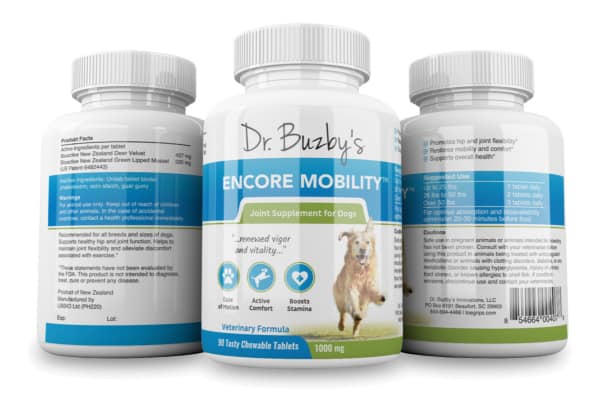
Give your dog more good days.
Use promo code HAPPY to save 10% on Encore Mobility.
This amazing product combines the benefits of green lipped mussel for dogs and New Zealand deer antler velvet for dogs to reduce joint inflammation, protect and maintain joint health, promote tissue healing, and so much more. The infographic below gives you the scoop on all the benefits of Encore Mobility.
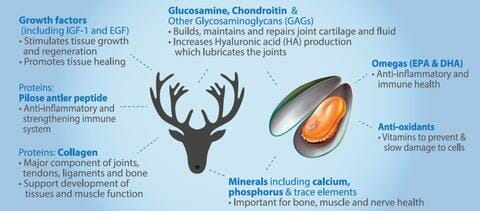
Other joint supplement ingredients that I would recommend include:
- Glucosamine and chondroitin sulfate—common joint supplement components which contain building blocks of cartilage and help decrease cartilage destruction.
- Methylsulfonylmethane (MSM)—compound which promotes new cartilage formation and has anti-inflammatory and pain-relieving properties.
- Turmeric/curcumin—popular human supplement which may have anti-inflammatory properties in dogs.
- Hyaluronic acid—main component of joint fluid which helps coat the cartilage to prevent wear and tear.
- Omega-3 essential fatty acids for dogs— anti-inflammatory substances found in fish oils and other sources.
- Cannabidiol (CBD oil for dogs)—hemp plant derivative which is not psychoactive and may provide pain relief.
Of course, always speak with your veterinarian before giving your dog any over-the-counter supplements or medications. He or she knows your dog and can recommend the product or combination of products that would be best suited for your pup.
Additional therapeutic modalities
Many arthritic dogs benefit from acupuncture, visits to the dog chiropractor, laser therapy for dogs, or working with a rehabilitation professional. I love using acupuncture and chiropractic care as part of multimodal pain management, and have seen so many dogs benefit from it. Plus, laser therapy treatment can be a great way to reduce pain and inflammation and promote tissue healing.
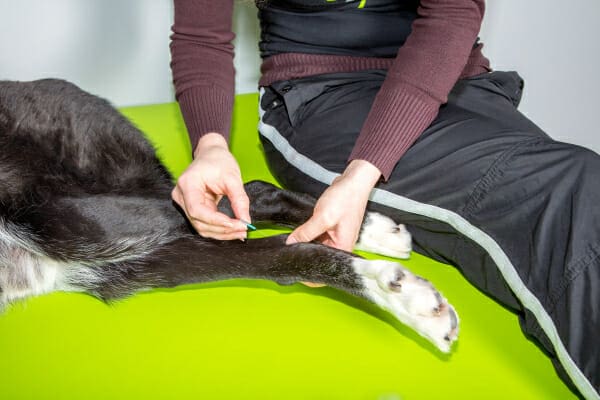
Physical therapy and rehabilitation are amazing for maintaining the muscle tone and range of motion that is needed for good mobility. To learn more about rehab, check out Cornell University College of Veterinary Medicine’s page on sports medicine and rehabilitation. There are a wide range of alternative therapeutic modalities available, so speak with your vet about what would be best for your dog’s condition.
Traction aids
I used to primarily recommend that people used rubber mats or non-slip rugs to help their arthritic dogs navigate on a slippery floor (and they do still have their place). But as you can read in the story of ToeGrips, that all changed once I discovered Dr. Buzby’s ToeGrips® dog nail grips.
These simple little rubber rings fit around your dog’s normal traction device—his or her toenails. Dogs typically use their toenails like cleats to grip the ground and gain traction. However, that becomes more difficult when they are on a slippery surface and have arthritis or other mobility-reducing conditions.
ToeGrips give your dog that extra bit of traction that he or she needs to walk confidently again no matter the surface. I have heard from hundreds of dog parents over the years who have been overjoyed to share how much ToeGrips have improved their dogs’ mobility and quality of life.
Household modifications
There are also a variety of ways you can help a senior dog with arthritis at home. Some of these include providing lots of soft beds, using ramps or steps to help your dog get into the car or onto your bed, and implementing an exercise plan appropriate your dog’s condition.
Gunner’s story: Why this dear old dog’s back legs collapsed
To help give all this information a furry face, let’s meet Gunner. He is an 8-year-old German Shepherd who has been my patient since he could fit in my pocket.
Unfortunately, Gunner’s dad had been noticing for the past several months that Gunner was slowing down. He had been having a hard time getting up off his bed and staggered a bit those first few steps after a long sleep. Gunner still ran around, but would sometimes bunny hop when he got going. Then one day he was out romping in the yard and his back legs completely fell out from under him.
When I saw Gunner later that morning he seemed ok. He was walking on all four legs without an obvious limp— though his hips did sway a bit. He’s a stoic guy normally, but he did wince when I put his hind legs through range of motion.
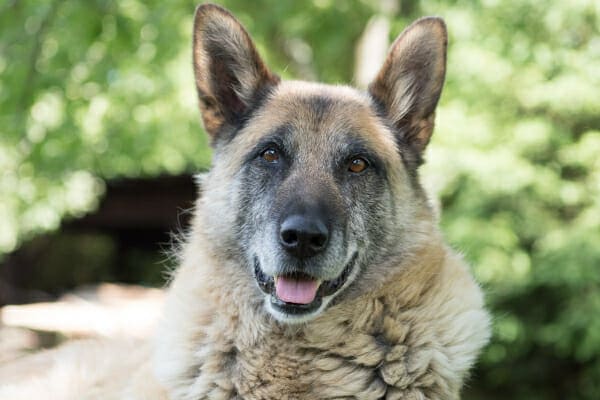
I decided to take some X-rays, which showed evidence of hip dysplasia as well as some arthritis in his left knee. (Gunner had torn his cruciate ligament and had surgery on that leg when he was two years old.) His blood tests came back normal. Especially since he is a German Shepherd, we had to think about degenerative myelopathy, but his presentation and diagnostics fit more with arthritis.
Good news for Gunner
I talked over the findings and the options with his dad. We put Gunner on a strict diet to shed some extra pounds, started a course of NSAIDs, and began acupuncture treatments. He showed improvement almost immediately!
I cautioned his dad that arthritis is usually a progressive condition so we will need to keep a close eye on Gunner to ensure his pain is managed. But right now, his dad is thankful to have his spry partner in crime back. And Gunner is much happier to have his arthritic pain and inflammation managed. He’s back to running around and finding all the trouble he can get into!
Work with your veterinarian
If like Gunner, your dog’s hind legs are collapsing, talk to your veterinarian. He or she can help get to the bottom of the problem, tell you what to expect, and formulate a treatment plan. You know your dog, and you are one of the best people to assess how things are going because you see him or her every day. So if your gut is telling you something is not right with your pup even if you aren’t seeing any collapsing, check in with your vet.
Many of the six conditions I’ve described above will require some modifications to the treatment plan over time, which is why an observant owner and a dedicated vet can make such a great team. Together you can help give your dog more good days, which is always a win!

Have your dog’s back legs ever collapsed? What was the reason and how did your dog do afterwards?
Please comment below.



My 18 1/2 year old bichon frise has arthritis and it seems her problem is in her low back , maybe hips – not sure. The last year her walking has become wobbly with her hind legs. She slides and hind legs splay. We have tried all the vet medication treatments/injections. Her hind legs still have strength as she hops up the stairs like a rabbit. I tried the socks and they slipped off. I was interested in getting her a soft brace that is advertised for the hips. There are ones for the legs but I don’t think that’s her problem.. Would a brace help with arthritis issues? And do you have any recommendations? Thank you Margot
Hi Maureen,
I am sorry your senior girl is starting to have mobility issues due to her arthritis. While braces are great at providing stability to joints, they don’t help much with traction. It may still be worth trying a brace just to see what sort of improvement it offers. If you are not sure what joints are affected, I highly recommend you contact your vet. They can let you know if any specific issues are already documented in your pup’s medical record or if a physical exam is needed. It is much easier to get the right brace once you have a definitive diagnosis. Also, your girl sounds like the perfect candidate for ToeGrips. If you haven’t considered giving them a try, I encourage you to give us a chance to offer your girl the traction she desperately needs. We offer a no-hassle 30-day money back guarantee so our customers can try ToeGrips risk free. We also have an amazing customer care team that is on standby to help with sizing or troubleshoot any issues that may arise. You can contact them at: [email protected] or send a text to (843)781-7430
I am hopeful you can find a way to improve your sweet girl’s quality of life. Wishing you both all the best and keep up the good work!
hello I have a 12 yr old male chihuahua that has had a stroke it was my aunts dog but I have him but anyways he was doing fi e until he tried to get on my other dog she’s in heat and wonder if he messed his back cause he’s been in bed for several days now barely walks on his hind legs they drag his back has a lump kinda shape is there anything I can do before I go to the vet.
Dear Kevin,
I am sorry your senior pup is experiencing these worrisome symptoms. From what you describe, I am suspicious he may have ruptured a disk in his back. This does not sound like what I would expect with a stroke. Please take him to your vet right away. If this is intervertebral disk disease (IVDD) it may just require anti-inflammatories and rest, but sometimes is life threatening and would need surgery for any chance of recovery. Here is a link to another article with more information: IVDD in Dogs: Why it Happens
Hoping you can get answers quickly and praying for a positive outcome for your sweet boy.
I have a 15 year old pug who ate some mushrooms a year ago had bad diarheaa and vomiting I rushed him to vets they recommended he stay in over night on a drip the next day when he came out the vets he fell over I took him back and had a blood test done no kidney damage but ever since(1 year ago)his legs are wonky and especially in the mornings he has trouble getting up his hand legs collapse takes him 3or four go’s to get up…..what can and should I do?
Dear Clint,
I am sorry your senior Pug has been living with these hind limb issues for over a year. From what you describe it makes me suspicious about a neurological problem and arthritis may be playing a role as well. Unfortunately, without examining your pup myself, it is hard to make specific conclusions and recommendations. Have you talked to your vet about these ongoing symptoms? You may want to consider scheduling a consultation with a specialist. Hoping you can find the answers you need to get your sweet boy relief and restore his quality of life. Wishing you both all the best.
My boyfriend’s dog, some kind of terrier, is old 10+ years. He has a skin condition and has lost all of his fur and his skin gets crusty. He has had trouble walking for awhile but was mobile, now he can’t move his hind legs at all and it seems like his front leg is hurting so he can’t hold himself up anymore. His spine is curved now because of it. He has started going to the bathroom in his bed but we aren’t sure if it is because he has trouble getting up or if it is time. He can’t afford tests and I don’t know if the dog would survive any surgeries. What do you suggest we do? Could we relieve his pain or fix his legs at all?
Hi Cheyenne,
What a difficult situation. I agree that the fact that he can’t move his hind legs or get up and is now going to the bathroom in his bed is pretty concerning. Without being able to examine him, it is hard to say for sure what if anything could be done to help him regain mobility. Based on the severity of his condition, I do recommend trying to get him into the vet sooner rather than later. I know you said your boyfriend can’t afford any tests, which is fair. However, even without any other tests, a physical exam by a veterinarian could help you get a much better idea of what the outlook for your boyfriend’s dog is. Perhaps there is a low-cost clinic in your area that you could go to? Since you mentioned it, I do also want to say that I agree with you that he may be reaching the point where euthanasia is the kindest decision and the best way to relieve his pain. Thinking of you as you look for the best path forward.
I have a 14 year old Springer Spaniel, he’s an adorable old boy.
he’s been bunny hopping since I have known him,.. most of his life his father had fused hips.
We adopted him from my uncle about 9 months ago and he’s been dropping weight as he was a little chubby. but in the last 5 months he’s been mobile and sprightly, he has two low impact 20min walks a day but in the last couple of days his back legs have been failing him and he is struggling to stand from laying or sitting and at times just has just dragged himself around on his bum.
he takes YouMove and has a healthy diet… we are worried about him. any advice?
Hi Abby,
I understand your concern for your senior guy with this recent change in his mobility. If you haven’t had him evaluated by your vet since this started, I would highly recommend you give them a call. It is possible this could be something completely unrelated to his hips, such as IVDD or a spinal stroke. Of course, without examining him myself I can’t make specific conclusions. Hoping you can quickly get some answers and start the appropriate treatment. Wishing you all the best and praying for healing for your sweet pup.
Hi Doctor..
My 14 year old dog is a mix of a Labrador and its been a while now I have noticed that he suffers standing up sometimes.. I thought this is normal due to old age but lastnight was a very cold night and when he tried getting up he was suffering and his hind leg was shaking and he was looking at me for help.. I was so worried and unsure what to do, he tried getting up and managed but walked for abit and just layed down again. I don’t know if it’s old age or maybe cold cramps? but his leg was shaking and he couldn’t straighten it and it was so heartbreaking seeing him like this.. but then later in the night he was fine again and back to normal..
Hi Smiley,
I understand your concern for your senior guy and think it is good you are searching for advice. Unfortunately, without examining your boy myself, I can’t make specific conclusions or recommendations. Your best plan of action is to contact your vet and schedule an appointment to have your pup evaluated. I am hopeful your vet will be able to find some answers and offer the appropriate treatment plan. Wishing you all the best and praying for a positive outcome.
I have a 13 yr old German Shephard. well trained tracker. he has been declining in mobility for a while especially his hind legs. His rear spine and hind legs gave dropped significantly and the past week he has been knuckling. our vet us only open 2 days a week since they changed hands and it’s a wait to get him in. He constantly whimpers now. dies not want to walk unless he has to. we have a large deck with steps and he is having tremendous difficulty using them. He has gone deaf but his eye sight seems good. with the symptoms he us having I’m afraid it may be degenerative myelopathy. I can’t bear the thought of him being in his last days because he has been my work partner for years. I know the day is coming and I don’t want to think about it, but it is not fair to him to suffer. 😫
Dear Lisa,
My heart breaks for you as you face this difficult situation with your Shepherd. I too am suspicious of degenerative myelopathy from what you describe (and the breed). Hoping you can get some definitive answers and find the best way to keep your sweet boy comfortable and happy during his final days. Praying for a miracle and wishing you strength and peace. ♥
Get your dog to a NEURO VETERINARIAN ASAP!
My golden doodle just turned 5. On Christmas she started limping on her right leg after we were running/ walking at the park. The vet thought probable soft tissue injury and we went home on rest and NSAIDS. Soon after it changed to her left leg – she was limping and licking this paw. We went back to the vet and due to the licking they thought this was her allergies, cytopoint and topicals fixed her red paw. But now it seems just to be general back leg weakness where it’s hard for her to get up after resting, but does ok once she walks it off. Her back end seems weak though, stiff legs and sometimes shaky. She sometimes cries while just lying still. She still runs and walks fine once moving though – should I go to the emergency vet or?
Hi Kelly,
I understand why you are concerned for your pup, and I agree these symptoms are a bit worrisome. Without examining her myself, it is hard to make specific conclusions. The fact that your girl’s lameness has shifted to a different leg really makes me suspicious about tick borne diseases such as Lyme or Ehrlichia. It may be time to do some more in-depth testing (lab work, x-rays, etc.) or even ask for a referral to a specialist. I am hopeful you will be able to get some answers and offer your sweet girl relief. Feel free to keep us updated on how she is doing. Wishing you both the best of luck!
Hello,
Our 14 year old Bassett hound, Smokey has been a great joy in our lives. We rescued him from terrible conditions but I like to think that he rescued us.
In the last few months he had started to go blind in one eye. We’ve been able to keep him happy aside from the loss of vision.
This morning was the first day I’ve seen such a drastic change in his back legs. I’ve helped him up from the lying position and he’s been terribly stiff. He walks only a few feet and needs to stop. When he stops to do his “business “ his legs shake. The drastic change is heartbreaking.
I know this is the start of his journey over the bridge. His currently is snoring away near the fireplace. I’ll let you know what our vet tells us.
Karen DiMuccio
Hi Karen,
My heart goes out to you as you face this unknown future with Smokey. I understand how sad it is to see a beloved pup’s health start to decline. Hoping your vet will have some good ideas about ways to make him comfortable and give you more quality time together. Wishing you both the best and looking forward to your next update. ♥
Hi I have a soon to be 7 yo English Bulldog. She had been occasionally limping for a few months which has gotten worse. Vet examined and said possible luxating patella. Sent us home with anti-inflammatories and joint supplements.. is getting worse and worse where she doesn’t even wanna walk took her back to the vet did an x-ray and said she has calcifications in her legs by her hip mild dysplasia and arthritis. Now she’s back on anti-inflammatories and another drug to help enhance pain med. I just ordered her a sling to get her up-and-down steps but I feel that this feels hopeless. She’s so young . Any advice?
Hi Darese,
I am sorry your Bulldog is struggling with severe arthritis pain. It sounds like you are headed in the right direction, and I understand how difficult it can be to find what combination of therapies works best. There are SO MANY options available from physical therapy, laser therapy, PEMF or even acupuncture. I will attach links to other articles with more information. I am certain you will find new ideas and ways to help give your sweet girl some relief.
1. How to Relieve Arthritis Pain in Dogs: The Ultimate Guide
2. Natural Pain Relief for Dogs: 13 Methods
3. PEMF Therapy for Dogs: 7 FAQs Answered by a PEMF Expert
4. Dog Arthritis Treatment: 8 Ways to Help a Senior Dog at Home
i have a 12 year old brindle Lab and hound mix. He has been suffering with weak legs for a year and this weekend it got worse. His first time was about a year ago while on vacation he was found to have lyme disease and hs legs went limp. Over the weekend he can hardly walk and has a small cut on his back paw on top causing me not to be able to put pressure on the one foot. I been giving him hip and joint medicine and doogie aspirin for pain. Seemed to be working fine and i think its not helping anymore me and my husband are upset and know the time my be near. I am abou t to cry as i type this What i been reading on your website been a big help and prepareing me for th worse thank you so much
Dear Cheryl,
My heart aches for you as you face this emotional decision. I am sorry your senior guy is in pain and struggling with mobility. I know you would do anything you could to extend his life, but sometimes letting go is the only way to give a beloved pup freedom and peace from suffering. The choice to allow your own heart to break to take away his pain is the most unselfish act of love anyone can make. I am praying for your strength and comfort. Bless you both.
My vet diagnosed my 16 year old golden doodle with suspected degenerative myelopathy about a year ago. I have noticed progression in her having difficulty getting up, walking, and maintaining position when pooping. She also seems to be having some cognitive difficulties (stares blankly at times; whines, growls, barks at nothing, especially at night; sleeps most of the day. Recently she has started licking/chewing her back and now has a large bald spot. Also, when I pet/scratch her back and side her hind legs collapse. But, most times she seems happy and smiles. I am at a loss as what to do.
Hi Richard,
My heart goes out to you. It can be so difficult to watch our beloved dogs grow older and develop more and more medical problems. Many of my clients find it helpful to either use a quality of life scale (link to article below) or a calendar with the days colored in as green (good day), yellow (ok day) and red (bad day) to get a better sense of a dog’s overall quality of life. Then, if they notice the quality of life is trending downward, we can have a discussion about if there are additional things we can do to improve quality of life or if it may be time to start thinking about euthanasia.
I hope that the way forward becomes clear to you. Don’t hesitate to reach out to your vet for advice and guidance as well.
Using a Quality of Life Scale for Dogs
My poodle recently fell off the couch playing and tore the cruciate on left leg, during recovery she overused her right hip and I believe she has pulled a muscle. Vet did X-rays which show the tear and shows something going on with the hip. Vet put her on galliprant and flexidin. I am faithfully giving that, I am also doing gentle leg lifts and massaging the hip muscles gently each day. I dont let her jump, walk stairs, no running. She is being babied. Making progress each day. Anything else I can give her or do to help her? Thanks
Hi Donna,
I feel for you! It is always rough when a dog injures one leg and then injures the other one in short order. It sounds like you are doing a great job of caring for her, but if you want some additional ideas, feel free to check out my blog on natural pain relief for dogs. It goes over acupuncture, supplements, laser therapy, PRP, PEMF, and a variety of other options that can provide great support to dogs who are recovering from an orthopedic injury. I’ll link it below.
I’m glad that she is making progress. Hopefully she makes a full recovery and stays injury-free for awhile!
Natural Pain Relief for Dogs: 13 Methods
I have a 17 year old hound dog that I adopted as a puppy who began experiencing arthritis and stiffness when walking a few years ago at which point I started him on Dasuquin soft chews with other supplements and tumeric chewies for dogs. That all helped for a while but in last year I noticed his muscle in his hind legs are totally gone at the same time he is experiencing muscle loss over the rest of his body, eyes sinking into his skull and generally looking emaciated despite blood tests showing that he has excellent liver and kidney function and no other issues other than periodic UTI which we’ve fixed as it happens.
My understanding is that at this extreme age he is just losing all of his muscle mass at final stage of his life. At this point he can’t even stand so I’m using straps to walk him gently with assistance and putting him in washable diapers and bathing him twice a day.
MY QUESTION FOR YOU: Is there any point in continuing to give him Dasuquin and the other chewables that claim to improve muscle mass in dogs or at this point should I just be keeping him comfortable and happy for his final days. Those pills seem to be for reducing acceleration of loss of muscle mass rather than reversing it.
Hi Tony,
I am sorry your senior boy is having issues with muscle wasting and his mobility is declining. Dasuquin is only used for joint health and comfort and does not claim to contribute to muscle health or improve muscle mass. Turmeric is a great anti-inflammatory but again is not recommended to help with muscle loss. If you pup is willingly taking these supplements with no issues, then I would recommend continuing their use. They may be helping more than you think and I would hate to discontinue them and cause harm unintentionally. I do think it may be a good idea to consider palliative care at this point. You could reach out to a veterinary in your area that specializes in hospice care. I hope you can find the answers you need to ensure your sweet boy’s last days are full of comfort and happiness. Wishing you the best and bless you both.
Hey, my friend has a golden retriever who is 11 and all of a sudden he lost mobility to his back legs. As he is up in age I was wondering what options one could consider. As well I was wondering what could possibly be his diagnosis? He’s seems perfectly fine with everything else.
Hi Anonymous,
Your friend is lucky to have someone helping to find some answers about this mobility issue with their dog. Unfortunately, without examining the dog myself, there are just too many possibilities to consider. He really needs to be evaluated by a vet and the timing could be crucial. If the cause of this new symptom is neurological or due to something like a blood clot, the longer you wait to start treatment the worse the prognosis. I hope your friend can find the answers they need to help restore their dog’s quality of life. Wishing everyone involved the best of luck!
My 12year old labs back legs are limp & collapsing she is already on medication for arthritis, green lipped mussel & an MS drug trail which has been working great. But this morning she has been unable to walk with out collapsing. Almost as if her legs don’t know what to do..
Hi Nikki,
I am sorry your senior girl’s mobility is declining so fast. I highly recommend you contact your vet and let them know about this sudden change. They may want to do some testing to see if her condition has progressed or if there is something new contributing to her symptoms. Hoping for answers and a clear path forward.
Renzel is 14 yrs old. Im hoping and praying for his long healthy life ahead. But today, I saw him swayed and collapsed abruptly after trying to get up from long hours of sleep. I felt devasted and feared of losing him soon. I’ve started giving him glucosamine this September for possible arthritis. Though Im not open to any possible surgery, I would rather give him pain reliever. And when things get worst, Im ready to accept euthanasia as last resort. That’s one truth that is really difficult to ponder. Old age is always the end of the line. I’ll just see him in heaven when the time comes. I love him so much.
Hi Jc,
I understand your concern for Renzel and these new worrisome symptoms. While arthritis could contribute to these issues, I am suspicious of a neurological problem or seizure episode. Since I haven’t examined your pup myself, it is hard to make recommendations. I think it would be best to have your dog evaluated by your vet. It is possible a simple medication could really help improve your senior guy’s quality of life. I hope this situation has an easy fix and can offer a positive outcome. Wishing you both the best of luck.
My staffy’s legs collapsed during/immediately after a dental procedure. Fair play, she was a greying old girl, but with a good heart, plus she managed to walk just fine to the appointment. She was handed back to me as basically a cripple with an appointment to come back after 5 days. This time was spent with me camping on the lino floor in the kitchen with my girl so as I could hold her up so as she could pee. Worst 5 days of my life. Then, they put her to sleep. Weeks later, I’m becoming more destroyed as the days pass. Was offered zero solution; only a free cremation by the vet company (through guilt, I fear, although the vet seemed genuinely distressed by the whole thing)
Thoughts?
Dear Robert,
My heart aches for you and the recent loss of your beloved pup. I know you were trying to do what was best and recommended by your vet. It is a sad truth that sometimes, despite our best efforts, unexpected complications arise after an anesthesia event. There may never be a way to know for sure what caused this sudden decline in your dog’s health. It sounds like you made the best decisions possible in every step of this tragic circumstance. I have no doubt your senior girl knew how much she was loved. Try not to carry the burden of contemplating the “what ifs”. May her memory be a blessing and bring you comfort as you continue life’s journey.
After a day of a lot of jumping while we were shoveling snow in January, my 8 yr old very healthy and active McNab suddenly began walking very strangely, swaying and dragging a rear back leg. Diminished foot turnover exam at the vet in both rear legs. Imaging (X-ray) and bloodwork were largely unremarkable with some very mild arthritis to a few toes. He showed improvement over the next few months on medication and was weaned off over the last month.
Seven months later and he still can’t jump into the truck/onto larger objects like he used to with ease. Still has a wobble and “hop” to his gait. He has had “Elvis leg” since he was a puppy that only ever presented when he was excited but which this year become much more pronounced and sometimes happens without provocation. Vet has advised no further imaging unless things worsen as she thinks course of treatment will likely be the same regardless of diagnosis. I’m thinking I have an older dog with some neurological disorder that hopefully progresses very slowly! Interested in your thoughts and also wanted to share our experience for other dog parents out there.
Hi Liz,
Thank you for taking the time to share your story with our readers! Your dog’s case is puzzling and has me curious about what his diagnosis could be. I am glad it is progressing slowly and allowing your more time with your sweet boy. If you decide to pursue further diagnostics or just want to know your options, you can always schedule a consult with a veterinary neurologist. I too would probably forgo expensive testing and just let him live his best life. I do think physical therapy/rehabilitation could be of great benefit no matter what the cause of his issues. I have also seen great results from acupuncture and laser therapy. I hope McNab has many happy days ahead and wish you both the best.
My 11 yr old catahoula mix began experiencing arthritis and stiffness in one of his back legs. He’s been taking glucosamine for months but not sure how much that has helped. Then last night he started struggling with both back legs. He seemed ok in the morning, and then all of a sudden, both back legs gave out, and now completely atrophied by the evening. I have a vet appt in 2 days but I am not even able to move him at all from the floor. I know this could be the end of his life but is there anything that I can do or give him to make him comfortable in the meantime?
Dear Catahoula mom,
I am so sorry your senior boy had to endure this tragic episode. What you described sounds like an emergency, and I am not sure there would have been anything you could have done for him from home. Were you able to get him to the vet for evaluation? How are things today? Praying all is well and your sweet boy was able to recover. Feel free to leave an update if you have a chance.
I found 16 year old jackrussell sat on the floor unable to stand up . When I managed to get him up he was walking around but his back fell looked like it was having a spasm. When I touch his leg he seems to be in no pain he doesn’t cry or moan. He’s currently fast asleep now I’m just unsure what to do .
Hi Katelyn,
The symptoms you are describing are quite puzzling and concerning. Since I haven’t examined your dog myself, I can’t make specific conclusions or recommendations. My best advice is to have your dog evaluated by your vet. They may be able to prescribe a medication that would greatly benefit your pup.
My 14 year old German Shepard/lab puppy, his hind right leg is hard for him to lift him up, so I take a towel and place it under his belly to lift him up.
Once on his fours and outside, he is able to go potty and pee. However you are righ, he is a little bit overweight, and have him on a diet, he is even walking little bit.
Hi Bryan,
I am glad you have found a way to help your senior guy with his mobility issues. If you have not had him examined/evaluated by your vet, I would highly recommend it. There may be a medication or supplement that could help increase his ability to use his leg. Also, shepherds are more at risk of a chronic condition called degenerative myelopathy. This disease causes weakness in the rear limbs that slowly progresses to a complete loss of function and an inability to walk and control their urination and defecation. It would be a good idea to rule this out so you don’t have to worry about it in the future. I wish you both the best and good luck!
Hi,
Our 15 1/2 yr old Maltese has multiple myeloma and multiple internal tumors. She did 6 months of weekly chemo and is now about to start monthly at home chemo as her prognosis did not change and we just hope to keep her comfortable in her last days.
For the past couple of months after dinner, her back legs completely give out. She has seen neurologists, her vet, oncologists and no one knows why. By the following morning or later in the night she regains mobility.
She’s not a great walker as she has arthritis and bad knees but it’s so hard to watch her temporarily paralyzed every night after dinner. Any thoughts? Thanks!
Hi Iris,
Your senior girl definitely sounds like a complicated case. Since I haven’t examined her myself, I can’t really make specific conclusions. Usually in these instances I would recommend you seek a consult with a specialist, but you have already done that. Unfortunately, you may never know the cause of her hind limb weakness/paresis. I hope despite this strange and puzzling symptom she is able to stay happy and comfortable for her remaining days. Give your sweet girl a hug for me!
We were hoping for IVDD and were going to perform the surgery on our 15 year old Pomeranian. The imaging showed an aggressive bone cancer pushing on the spinal column. We were so devastated. We had been through multiple vets and visits to try to help him and there is much guilt for not doing more, sooner. We let him go peacefully on April 21st but it has devastated me. I see that osteosarcoma isn’t on this list, as it should be. Imaging for tumors should almost be more of a routine thing for some animals (and people!) before things get so bad, you don’t even know if you’re exascerbating something. I am feeling awful for giving him his vaccinations when we didn’t know he had cancer.
Also, in his last days, we wanted him home, but were unable to find short-notice in-home euthanasia. Everyone insisted on scheduling weeks out. Who schedules euthanasia that far out? I understand that there may be limited people, but I feel it’s more of a service to offer a semi-emergency notice so people don’t have to let them go too soon. I felt alone and in a panic on his last bad day. We had to find a clinic and stress him out at a strange place and room. I held him as he crossed over, but that was not what I wanted for him. He deserved more.
Dear Susan,
I am sorry for the tragic loss of your Pomeranian boy and hate there was not more that could have been done to prolong his life. I am glad you wrote this comment about osteosarcoma. While the article tried to hit on the most common reasons for collapsing rear legs, it doesn’t cover everything. I hope that your willingness to share your story will benefit other readers that might be in the same situation. I understand your grief over how his last day happened, but I have no doubt he knew how much he was loved. I hope with time your heart will heal and be comforted by the knowledge that you did everything you could. May his memory be a blessing. ♥
To All,
My 13 yo American Eskimo was having trouble with his hind legs when standing. I tried Dr Buzbys Encore Mobility. It provided help in about 5 days. He is now able to get up almost normally on carpeted rugs. May products have high claims, but this product REALLY works. (I was not paid to say this.) Also, we got a younger active dog that has kept him busy “going outside”, barking at people outside the house, and walking. Dr Buzby, many thanks for giving us more time with our beloved dog!
Tom
Hi Tom,
This just put a huge smile on my face! I am so happy to hear your senior boy has improved and is living his best life. Thank you for the kind words about Encore Mobility and for sharing your experience with our readers. ♥
Three days ago my GSD Calypso couldn’t get up. He is slowing down and has difficulty to squat while poop and was getting weaker & weaker.
He is on regular dose of 30 mg of cortisone per day for skin issues.
He is around 80 lbs and become complete immobile, he is in terrible pain & is panting heavily.
Please help.
Hi Dinesh,
You are right to be concerned about your Shepherd’s quality of life. It sounds like he is really struggling and needs to be examined by a vet as soon as possible. Shepherd’s are known for developing a condition called degenerative myelopathy and I am suspicious that this might be the case with Calypso. Since I haven’t examined him personally, I can’t make specific recommendations. I will attach some links to other articles that might offer new information. If Calypso’s pain cannot be controlled and he is suffering, then letting go might be the most loving option at this point. I am sorry you are in this difficult situation. I hope you can find the answers you need to help your boy find peace and comfort.
1. Signs Your Dog is Dying: A Caring Message to Bring You Peace
2. Dog Hospice Care Can Bring Peace and Dignity to Your Dog’s Final Days
3. Degenerative Myelopathy: How to Care for Your Dog with Compassion and Confidence
4. Preparing for Your Dog’s Euthanasia: 10 Thoughts for Peace
Three days ago my 4 year old, 18 lb. shih tzu-lhasa apsa mix Chloe was healthy and mobile. We walked an easy mile and she played for hours in the back yard. She had no trouble eating her evening meal. Around 10 pm something about her did not look right. Brought her up for a close up exam and her head was pointed up unnaturally and not moving, Her eyes were also not moving. She did not appear to be in any pain but had lost control of her rear legs. We took her immediately to ER vet wher they gave her all sorts of tests and an xray. The next day transported her to a veterinary hospital for a neuro consult but no CT or MRI. Suspect IVDD was diagnosis. Gaba, Carpro and Diazapam regimine with 6 wks. exercise restriction. Today Chloe’s natural face and eye aspect is back but she stiil can take only 4-5 steps before she slumps over on her hind legs. Should we proceed with the invasive (and expensive) surgery that an MRI may indicate?
Hi Mark,
I am sorry Chloe is having such a difficult time. I am glad you were able to get her to the vet so quickly after her scary episode the other day. Since I haven’t examined your girl myself, it is hard to make specific recommendations. I do think you should call the neurologist and discuss your concerns and give them an update on how Chloe is doing. Also, gabapentin is an amazing medication but can cause your dog to be a bit wobbly for the first few days after treatment is initiated. So, I am not sure if the trouble walking is still from the IVDD or a gabapentin side effect. I will attach a link to another article that may offer additional information. I hope Chloe starts to feel better soon and can get back to living her best life. I wish you the best as you navigate this difficult road ahead.
Gabapentin Side Effects in Dogs Are Nothing to Fear
What should be done for my dog who is going on 17 years old. His hind legs are collapsing at times when he tries to walk. He has to be helped to get up sometimes. He is on gabepintin, galliprant, amanantine, and a joint supplement.
Hi Annie,
It sounds like you are doing just about everything you can to help your senior boy. Since I haven’t examined your dog myself and don’t know what his actual diagnosis is, I can’t make specific recommendations. It might be a good idea to talk with an integrative veterinarian or one that specializes in rehabilitation. Your boy might benefit from treatments they could offer such as laser therapy, acupuncture, chiropractic adjustments, or underwater treadmill. Also, as I am sure you are aware, at some point the medications and treatments just will not help enough to maintain your guy’s quality of life. At that point, you could look into hospice or palliative. I hope you can find a solution that works for you and your sweet boy. Best wishes!
My old english sheepdog Flo is almost 12. She has been struggling for some time to stand and I have various aids to help me lift her.
She has been diagnosed with arthritis and is on Gabapentin 2 x 300mg per day and 1 dose of Loxicom 45ml. She weighs around 50kg.
Flo gets no tit bits and I work hard to try and reduce her weight but without much exercise its difficult.
Her condition is worsening and she can no longer get up on her own, but she seems happy and is still playful when sitting, its very difficult to know what to do next.
As Flo cant get into the car its difficult to get her other treatment.Is there any other medication I could try?
Hi Andrea,
I understand your concern with Flo and needing to find additional ways to reduce her pain and help improve her quality of life. It is so hard when giant breed dogs have mobility issues! Since I haven’t examined your girl myself, I can’t make specific medication recommendations. I do think it would be good to talk to your vet about these concerns and see if there is another medication that could be added to her regimen. Also, you may be able to find an integrative veterinarian in your area that makes house calls. Laser therapy or acupuncture might be something to try. I hope you can find a solution that works for you and Flo. I wish you both the best!
My senior bichon frise’s back legs suddenly collapsed today sometime between 12-6 while we weren’t home. He is dragging back legs and tail. He is not in pain. He uses 1/2 normal without pain or discomfort. He does not have any help problems that I am aware of. I do not know what to do?
Hi Lidia,
Just like the article states, sudden collapsing of your dog’s back legs is always a medical emergency. If your guy doesn’t seem to be in pain, it could be due to a complete loss of deep pain that can occur with a spinal injury or disk rupture. I highly recommend you get your sweet boy to the vet as soon as possible. I hope you can get some answers that come with a positive prognosis for a happy future. Best wishes to you both!
Does spondylosis fall into a condition causing back legs’ collapse? My rescued geriatric Dutch Shepherd always swung his back legs together like a pendulum when he ran, thereby pitching himself onto his front legs and shoulders. No vet could tell me why he did this or what I could do about it until the last months of his life when the acupuncture vet asked for x-rays. Upon viewing them she declared he had the worst case of spondylosis she’d ever seen. Before that he’d had chiropractic, laser, hydrotherapy, acupuncture, all of which seemed to offer temporary relief. Tried a Walkin’ Pets wheelchair in the very end, but it was too late at 17. If pendulum like back legs locomotion is a sign of spondylosis, I know it when I see it.
Hi Mary,
That’s a good question! Spondylosis is when you get bridging of bone between two vertebra. There is a picture of it in the article labeled vertebral arthritis. This bridging occurs when there is some spinal instability, so the body lays down extra bone to help stabilize the spine. Since your dog had spondylosis, we know he had spinal instability and arthritis. The spondylosis itself probably did not cause the swaying of his rear end, but was more like a result of whatever was causing the spinal instability to begin with. I am glad you were able to be with your sweet guy for his senior years. May his memory continue to be a blessing.
Staff pray for my dog Stacy Michelle. I have to get her to dr tomorrow . She’s has been getting slower and I had been taking some joint chews . Now she can’t get up at all. I’m a senior myself and don’t have hundreds she needs to feel better. Her back legs aren’t working. I may have to say good bye for omorrow. She is about 14 or 13. I got her as a found puppy in 06. Or o7. Pray please that I can take her and that dr can give something that will make her better. Amen.
From the info I learned on line this doent look good
Dear Sherry,
So sorry to hear of your senior dog’s recent struggles. She was lucky to have been found by you as a puppy, and I’m sure has had a great life with you. It is never easy for any of us as our best friends get up there in age and lose their mobility. We will be thinking of you and Stacy Michelle as you take her to your local veterinarian. Hopefully, there will be things the vet can do to help her get up and move around more comfortably. Please keep us updated on how the visit went!